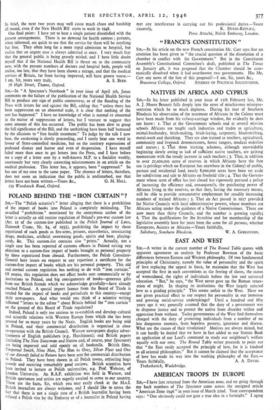NATIVES IN AFRICA AND CYPRUS
sER,--In his letter published in your issue of 15th February last, Mr. A. J. Moore Bennett falls deeply into the error of mischievous misrepre- sentation which he so much deplores. During his tour of Southern Rhodesia his observation of the treatment of Africans in the Colony must have been made from his railway-carriage window, for evidently he does not know: 1. That at the Government schools and at several mission schools Africans are taught such industries and trades as agriculture, animal-husbandry, brick-making, brick-laying, carpentry, blacksmithing, metal-work and thatching. They are also trained as teachers, agricultural, community and livestock demonstrators, forest rangers, medical orderlies and nurses ; 2. Triat these training schemes, although unavoidably beginning slowly owing to lack of sufficient native teachers, are gaining momentum with the steady increase in such teachers ; 3. That, in addition to over 21,000,000 acres of reserves in which Africans have the free use (a privilege which no European has anywhere in the Colony) of arable, pasture and residential land, nearly 8,0oo,000 acres have been set aside for subdivision and sale to Africans on freehold title ; 4. That the Govern- ment whose term of office has just closed has vigorously pursued a policy of increasing the efficiency and, consequently, the purchasing power of Africans living in the reserves, so that they, having the necessary means, will be able to provide remunerative employment for steadily increasing numbers of trained Africans ; 5. That an Act passed in 1937 provided for Native Councils with local administrative powers, whose members are Africans acting under the guidance of a Native Commissioner. There are now more than thirty Councils, and the number is growing rapidly; 6. That the qualifications for the franchise and for membership of the legislative assembly have for years been the same for all persons, whether Europeans, Asiatics or Africans.—Yours faithfully,


























 Previous page
Previous page